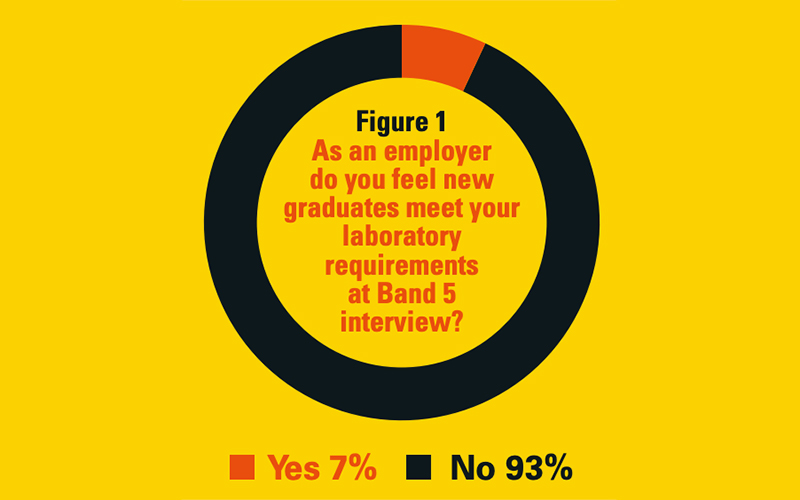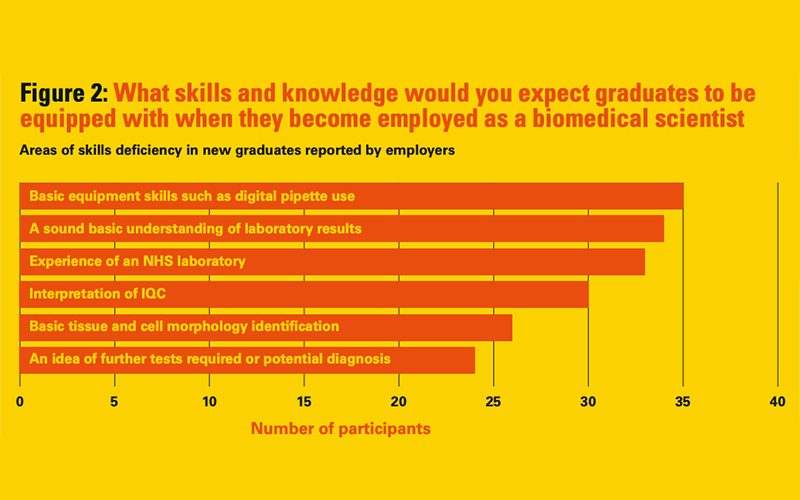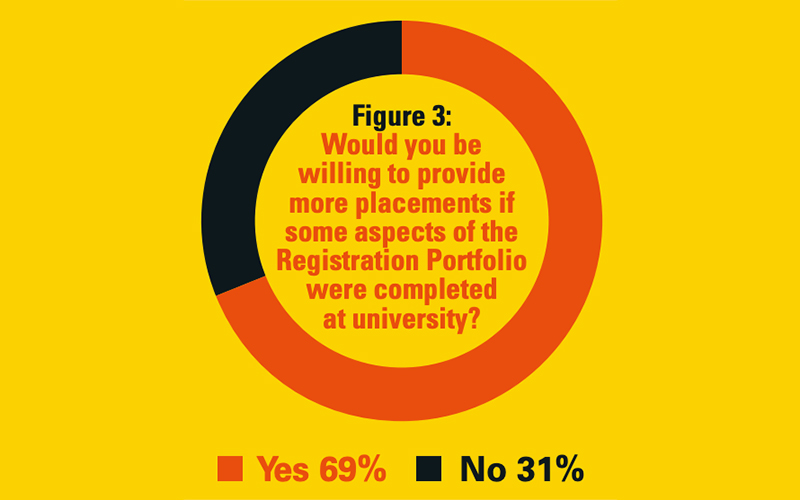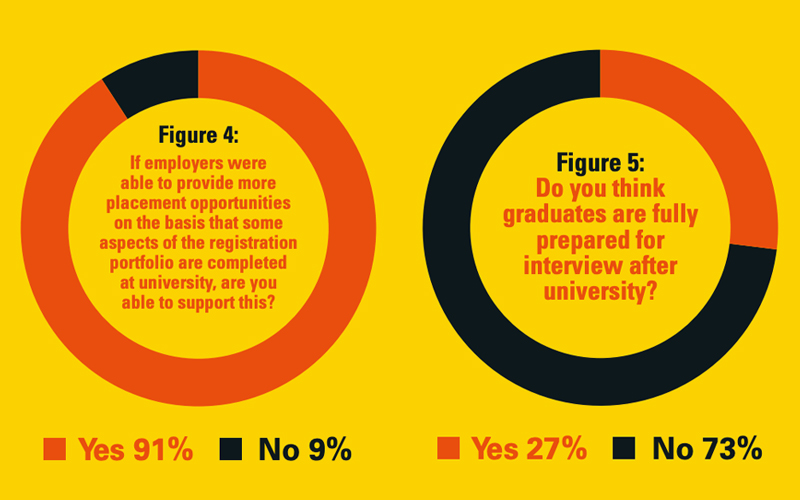Tahmina Hussain and Martyn Hicks interrogate the results of a study into gaps in the knowledge, skills and experience of new graduates entering the biomedical science workforce.

Graduate employability is becoming increasingly competitive in the biomedical science workforce with significant demands and pressures on the services delivered by pathology departments. An educational and employment research study was carried out to assess a perceived gap between the skills of new graduates pre-employment and employers’ requirements and expectations in a Pathology laboratory. The aim of the study was to identify in which areas the gaps in the knowledge, skills and experience lie in graduates and how those gaps could be bridged to better support employers and higher education institutes (HEIs) to influence the development and engagement of students with the curriculum. Two separate surveys were sent out to employers and HEIs to explore their perceptions of the employability skills in graduates. The data collection from this survey will be useful to the newly established practice educator network to better understand current shortfalls and assist the HEIs and employers to work together with the practice educators to put some robust measures in place that will improve the recruitment and retention rate of talented and skilled graduates in the biomedical science workforce.
The employers survey was distributed via the practice educator network across England and stimulated a healthy response from employers with a total of 42 replies. The survey for HEIs was sent via the IBMS to all universities in the UK providing accredited BSc biomedical science degrees.
A total of 11 responses were received. A definite trend was highlighted but also some contradictions between the employer and HEI responses.
The responses
In response to the opening question (Figure 1), 93% of employers who responded believe new graduates do not meet the requirements at Band 5 interviews. The top six reasons represented in Figure 2 account for 80% of the areas of deficiency with over 60% of responses indicating five or more of the skills that are lacking in these areas. The number of graduates without an accredited degree was also noted.

Out of the 93% of employers who stated that the shortfall in new graduate skills puts strain on lab services, 74% stated that this is also delaying the training and progression of other staff.
On top of the skills gaps noted by employers at interview, just 19% of employers think graduates are fully prepared for interview, with 95% stating that HEIs should do more interview preparation for graduates. The survey also highlighted that 88% of employers were not aware if HEIs included a pre-employment module into their curriculum. Just over half of the respondents (52%), are involved in employer liaison groups, of which 76% thought they produced a positive outcome for the employer, but there were mixed views on this.
Employer liaison groups
Responses from employers in relation to employer liaison groups are listed below:
“I don’t know what they are – never had an impact where I work as far as I am aware.”
“Not aware that I’ve witnessed much change from things raised at the groups to process/learning change at the HEIs – graduates are still coming out with the same deficiencies at interview as above – frustrating how many graduates don’t know basics on the full aspect of what constitutes a quality management system or teaching is not updated with current practice.”
“Currently this is the case as we have no programme at our local HEI that feeds directly into graduate roles within our department.”
“The liaison group is used as an opportunity to update annually on changes between lab and HEI and apply pressure to labs to continue to provide placement opportunities and encourage lab staff to provide uni lectures rather than as a pathway to facilitate change/gather feedback etc. that would benefit employers. The time spent could be used more constructively for the employer as it is generally driven by university interests.”
When asked what skills and knowledge employers would expect graduates to be equipped with to become a biomedical scientist, 64% of respondents noted the same key areas as indicated in Figure 2. There were a range of other skills noted – such as time management, professional attitudes and role awareness – for which employers suggested students would benefit from the help of a mentor. Employers also noted that they would expect graduates to have knowledge of UKAS as well as the role of pathology in patient care.

Placements, work experience and internships make a huge difference to employability skills, however, access to these opportunities are highly competitive. To explore the options to facilitate more placement opportunities, employers were asked if they would be willing to provide more placements to students if some aspects of the registration portfolio were completed at university, as this would reduce the workload and pressure on training officers. HEIs were also asked if they were able to support this. Responses from both surveys are indicated in Figures 3 and 4.

Those HEIs that stated that they were able to support completion of some aspects of the portfolio were asked to specify which sections they felt were appropriate to complete at university. There was an agreement across all responses that completing the knowledge requirements for all modules in Section 1 and some aspects of Section 2 (professional knowledge, health and safety and research and development) could be facilitated at university. One of the responses stated that “partial completion of the registration portfolio would have little value to those students who do not want to pursue biomedical science as a career”.
The responses from employers on whether HEIs should cover more of the Registration Portfolio was mixed. Many stated that Section 1 could be completed at university prior to placement, with Section 2 completed in a hospital laboratory setting, but a lot of the basic technical areas could be completed at university. Some employers noted a lack of training capacity as a major barrier, while others indicated that training graduates in basic methods and procedures was more of a problem than covering portfolio modules.
Employer feedback
Feedback from the employers included the following responses:
“Training capacity is already maximum - we need to balance the training of own staff via apprenticeship and student portfolio provision. Grow-your-own staff will be easier now our local university has a band 6 apprenticeship course (degree apprenticeship).”
“The registration portfolio is not the barrier to taking more students, it is the volume of internal trainees that we have that are in a training process and the demand outweighs the resource to provide the training.”
“Some of the knowledge sections, such as personal responsibility and development, equality and diversity, communication, can be generically taught.”
“The portfolio is a vocational practical portfolio where the training laboratory is signing off practical knowledge and competence of experience received in training. I wouldn’t want to be signing alongside a university mentor where I don’t know what they’ve learnt or witnessed myself/departments have witnessed. By completing it at uni it’s not giving ‘real life’ workplace experience, which is very important with the portfolio and the application of the knowledge.”
Responses from HEIs
HEIs were asked what skills undergraduates are provided with to help them step into employment on completion of their degree. In order of importance, the answers were: understanding of basic laboratory results, awareness of COSHH and health and safety regulations, ability to interpret and suggest follow-up tests, interview technique and practice and a good understanding of IQC/EQA and outliers.
Although 100% of the responses demonstrated that the top 5 skills indicated above are provided to undergraduates, 73% of the respondents at HEIs stated that they do not think graduates are fully prepared for interview after university, as indicated in Figure 5.

All HEIs that participated stated that they have an employer liaison committee. In total, 82% felt that employer liaison committees provide positive outcomes while 18% felt that there isn’t enough involvement of the committee.
Some of the responses from HEIs are listed below:
“There tends to be more HEI staff attending than employers. NHS staff are over stretched so do not prioritise working with HEI regarding this.”
“I don’t think there is enough physical involvement from the committee – ideally they would observe the student experience and we would also visit the hospital environment to understand where our students are struggling. We could then decide a positive way forward with clear actions”.
“Employer liaison committees fully embed NHS employers in the decision-making process, interview and selection of students, supporting students and verification of students alongside any programme amendments or improvements.”
“We have received good constructive employer feedback when graduates (or placement students) fail to demonstrate appropriate/sufficient skills which has fed into our course improvement processes.”
“It helps us to understand the requirements of the workforce, but often just turns into a discussion of the problems with the employers. We probably don’t utilise this fully, however since the pandemic engagement with the committee has been poor.”
HEIs were also asked if any pre-employment modules were integrated into the curriculum. While 45% of HEIs do not have any pre-employment modules, 55% include tutorials that build in employability skills, careers modules covering CV writing, reflection, CPD, practical lab-based competencies and placement preparation.
Academics also stated that the shortfall in employability skills is impacted by the difference in “what is delivered in a degree and the reality of current pathology labs; some academics have never set foot in a hospital lab” and “replicating laboratories in a university setting is very challenging”.
Next steps?
In summary, the employers have highlighted the gap in skills seen in new graduates that is impacting workforce and service delivery. Although the HEIs have demonstrated from the survey these skills are covered in the curriculum there is this disparity and three quarters of HEIs do not think graduates are prepared for interview. HEIs note employer liaison groups are often poorly attended by the employer due to laboratory pressures, but employer engagement is fundamental to addressing the issues they have noted. The practice educator networks are key to providing the missing link for employers and HEIs by increasingly networking and collaborating to engage stakeholders and influence workforce plans.
How can the issues raised in this survey be addressed? Suggestions to bridge these gaps are listed below:
- Introduce mentoring scheme
- Incorporate pre-employment module into HEI curriculum to include CV writing, job application support, mock interviews
- Placement preparation and integrate some portfolio evidence into curriculums (with input from employers)
- Employers to facilitate laboratory tours to provide insight for students and lecturers
- Post-degree support and follow up from HEI
- Modules to include professional bodies, HCPC registration and role of IBMS
- HEI outreach projects with stakeholders to include employer liaison groups – key HEIs to act on feedback to engage employers
- Students have access to mock laboratory results and interpretation utilising up-to-date methods in laboratory practical sessions
- Create virtual laboratory training platform, introduce simulation centres
- Employers to collaborate with HEIs to agree on appropriate evidence for registration portfolio.
Thank you to all participants in this survey as the data and feedback obtained add real value to the ongoing conversations around this subject. Special thanks to Brian Orman, PMO Support Diagnostics, NHSE South West Region for collating the data and responses.
Tahmina Hussain is a HCPC-registered Biomedical Scientist Lecturer at the University of Salford. Martyn Hicks is a Biomedical Scientist and Regional Pathology Apprenticeship and Educational Lead for South West England
Image credit | iStock |Shutterstock
